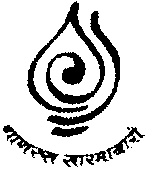
Every time we think of holding the mind we also think of its running. We do not want to unleash our minds but when we think of holding it we are not able to stop it from running wild. Where we do not want it to go, it definitely goes. A disciple was learning meditation from his guru. One day the teacher said, "Go and meditate in isolation. Meditate with complete concentration. But remember that your practice will be successful only when you do not think of a monkey. If you think of a monkey then your practice will be broken." The disciple after bowing to the teacher went into isolation. He sat down to meditate and he could think of nothing else. His mind was inexorably linked to the monkey. His teacher had placed a poisonous insect in his head. The poor fellow tried repeatedly to forget it. But each time he tried, the monkey would reappear before his eyes. He fell into the trap of the prohibited and his meditation was not successful.
The next day the teacher said, "Go meditate in isolation and watch the breath coming and going via your nostrils for an hour." The disciple did just that and within ten minutes he was feeling a sense of peace. Memory, thoughts and imagination were all locked out. In half an hour the idea of place and time also vanished. He sat in samadhi (a yogic state of complete concentration) for almost three hours. The teacher had not told him to stop the mind and so he too had not thought of stopping it, but it stopped. It stops by itself, it cannot be stopped. If we steady our breathing the mind will automatically stop. If we watch our breath the mind will automatically stop. When we stop the flow of agitation, the agitation automatically stops. If a water body has water there are ripples, but what if there is no water at all? The flow of restlessness in the mind is due to oxygen. When oxygen energizes the mind, restlessness arises. If the inflow of oxygen is arrested, how can there be restlessness?
Passions are also caused by the agitation of oxygen. If the oxygen is arrested then even if we want to get angry we are not able to. To get angry the first condition is to increase the speed of our breathing. If we increase our speed of breathing then we can get angry or vice versa. When the breathing is peaceful and slow we cannot get angry. In that state our mind is also not filled with sexual desires, not agitated by passions. All these are expressions of quick breathing. According to yogic studies, in anger a person breathes about thirty to forty times a minute. In times of sexual union, breathing increases to sixty times per minute and that is why it is said that mating destroys energy. Fear also increases the pace of breathing as well as the number of heart beats. If the feeling of fear is appeased the pace of breathing reduces.
There are three forms of the sea: the peaceful one, the turbulent one and the frozen one. The peaceful quiet waters do not pose a threat to the boat. In turbulent waters it is unstable. Northern seas are frozen and man can walk over them without fear. Our minds too have three states: peaceful mind, turbulent mind and the stationary mind. When the process of breathing is longer the poisonous carbon dioxide is fully exhaled; then the mind becomes peaceful. When the breathing is not long enough the poisonous matter is not fully exhaled then the mind gets agitated. As the process of breathing is slowed down, the mind becomes stationary. The state of samadhi is automatically reached.
 Acharya Mahaprajna
Acharya Mahaprajna


